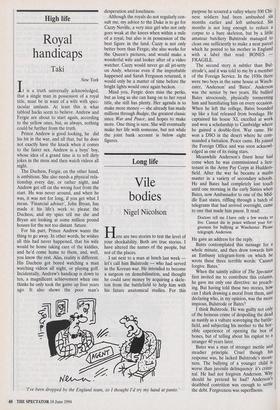Long life
Vile bodies
Nigel Nicolson
Here are two stories to test the level of your shockability. Both are true stories. I have altered the names of the people, but not of the places.
I sat next to a man at lunch last week let's call him Bulstrode — who had served in the Korean war. He intended to become a surgeon on demobilisation, and thought he could save money by acquiring a skele- ton from the battlefield to help him with his future anatomical studies. For this purpose he scoured a valley where 500 Chi- nese soldiers had been ambushed six months earlier and left unburied. Six months is not long enough to reduce a corpse to a bare skeleton, but by a little amateur butchery Bulstrode managed to clean one sufficiently to make a neat parcel which he posted to his mother in England with a label that read: BONES FRAGILE.
The second story is subtler than Bul- strode's, and it was told to me by a member of the Foreign Service. In the 1930s there were two boys in the same house at Winch- ester, 'Anderson' and 'Bates'. Anderson was the senior by two years. He bullied Bates atrociously, physically tormenting him and humiliating him on every occasion. When he left the college, Bates bounded up like a foal released from bondage. He captained his house XI, excelled at work and won a scholarship to Cambridge where he gained a double-first. War came. He won a DSO in the desert where he com- manded a battalion. Peace came. He joined the Foreign Office and was soon acknowl- edged as one of its rising stars.
Meanwhile Anderson's finest hour had come when he was commissioned a lieu- tenant in the Army Pay Corps at Hudders- field. After the war he became a maths master in a variety of secondary schools. He and Bates had completely lost touch until one morning in the early Sixties when Bates, now Ambassador to one of the Mid- dle East states, riffling through a batch of telegrams that had arrived overnight, came to one that made him pause. It read:
Doctors tell me I have only a few weeks to live. Cannot die in peace without your for- giveness for bullying at Winchester. Please telegraph. Anderson.
He gave an address for the reply.
Bates contemplated this message for a whole minute, and then drew towards him an Embassy telegram-form on which he wrote these three terrible words: 'Cannot forgive. Bates.'
When the saintly editor of The Spectator first invited me to contribute this column, he gave me only one directive: no preach- ing. But having told these two stories, how can I shirk drawing a moral from them, and declaring who, in my opinion, was the more impious, Bulstrode or Bates?
I think Bulstrode. He was guilty not only of the heinous crime of despoiling the dead as nastily as a vulture scavenging the battle- field, and subjecting his mother to the hor- rible experience of opening the box of bones, but of telling about his exploit to a stranger 40 years later. Bates was a man of stronger mettle and steadier principle. Cruel though his response was, he lacked Bulstrode's mean- ness. The bullying of a younger child is worse than juvenile delinquency: it's crimi- nal. He had not forgiven Anderson. WhY should he pretend he had? Anderson's deathbed contrition was enough to settle the debt. Forgiveness was superfluous.


























































 Previous page
Previous page